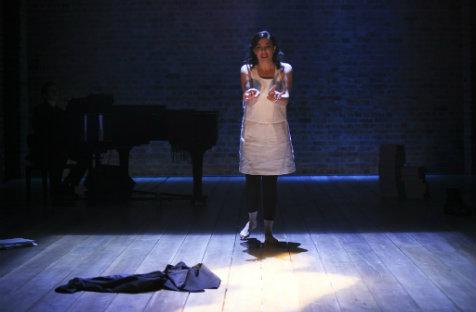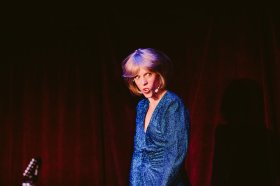The Royal Shakespeare Company’s ambitious production of this rarely performed tragedy was directed by Elizabeth Freestone, who also adapted it together with solo performer Camille O’Sullivan and composer Feargal Murray. O’Sullivan’s versatility in taking on the roles of both rapist Tarquin and his victim Lucrece is impressive, for the most part. The sheer number of iambic pentameter lines she managed to recall was a feat unto itself.
There are a couple of jarring moments when there is a complete shift from Tarquin’s terrifying resolve to rape to Lucrece’s drawn-out, pitiful pleadings against her oppressor. It seemed as though some of the dramatic tension dissipated momentarily while the audience was adjusting to the change in character and mood, and perhaps this could have been avoided with two actors taking on the roles.
The bard wrote this rather lengthy, physically and emotionally violent poem in 1594, when he was just 28. It must be said that while its lyrical beauty and philosophical depth have not withered with the passing of time, the gender politics of the piece feel very dated and at times dreadfully offensive. For example there is the outrageous comparative metaphor: ‘For men have marble, women waxen, minds/ And therefore are they form’d as marble will.’
The same applies to the focus of the latter sections of the poem on Lucrece’s dilemma of how to rid the ‘shame’ and ‘dishonour’ she has apparently caused her husband by being raped – surely such a framing of the issue would not feel appropriate for modern audiences. It is interesting in this sense as a historical document of the patriarchal dogma plaguing even some of the most enlightened writers of that age.
The boldest move in this production came in the form of musical compositions of around half of the verse, which were on the whole successful despite their earnestness. Sometimes the rhythms of the words arranged to the piano score felt forced and awkward, and it was difficult to make the lines out on a few occasions because of this mismatch. However, for the most part O’Sullivan and Murray arranged the poetry appropriately and O’Sullivan imbued the lines with well-timed emotional flourishes.
The composers also did well to excise a large section of the poem that functions as tangential ekphrasis – Shakespeare’s musings on a particular painting depicting the battle of Troy. The detour serves as a tangible image from which to begin drawing parallels between Helen of Troy and Lucrece, as well as a vehicle for partial amelioration of Lucrece’s despair, and is very interesting in itself. But it is not necessary to the arc of the narrative and the production was not impaired by its absence. This is a delight for lovers of Shakespeare’s verse.
The Rape of Lucrece
By William Shakespeare
Adapted by Elizabeth Freestone, Feargal Murray and Camille O’Sullivan
Director: Elizabeth Freestone
Performed & sung by Camille O’Sullivan
Music composition: Feargal Murray and Camille O’Sullivan
York Theatre, Seymour Centre, Chippendale
22 – 25 January
Sydney Festival 2013
www.sydneyfestival.org.au
5 – 27 January
Additional dates:
Southbank Theatre, Melbourne
31 January – 10 February





